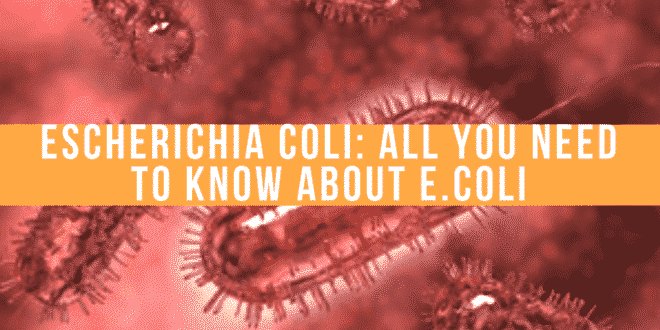By Mariam N. Contributing author and a cleaning expert
E.coli also known as Escherichia is a type of bacteria that mostly lives in the intestines of animals and man. This bacteria can also be found in the guts of some animals. The E. coli can be of different types -The Escherichia coli that is not harmful but help to keep the digestive tract health and the E. coli O: H7 that causes intestinal sickness known as Shiga Toxin Producing E. coli (STEC). This toxin damages the linings of an infected E. coli.
Symptoms of intestinal infection due to Escherichia coli
- Abdominal cramping
- Loss of appetite
- Nausea
- Fatigue
- Watery diarrhea which may later change to bloody stools
- Fever
- Bleeding
- Acute kidney failure in children and adult
- Confusion
- Gas
Other symptoms of severe E. coli infection between 5 to 10 days include
- Pale skin
- Bloody urine
- Dehydration
- Bruising
- Decrease urine output
Causes of E. coli infection
It is not an issue for human and animals to have E. coli in their intestine but having stains can cause infections. The infection causing bacteria can enter the human or animal body through the following routes
- Improper handling of food
One basic way of getting infected with Escherichia coli intestinal infection is through improper handling of food. Unsafe handling of the food in the kitchen, grocery stores and the restaurant can cause infection. Other ways foods get contaminated is failing to wash one’s hand completely before eating of food, consuming of food containing mayonnaise or dairy food that has been left open for too long, eating uncooked food and also, eating of raw products that is not properly washed
- Contaminated water
Drinking of contaminated water can also lead to Escherichia coli intestinal infection. This contamination can be through human or animal waste.
- Person to person E.coli infection can also be spread from the hands of an infected person to another. This is as a result of poor hygiene and not washing of hands after using a bowel.
- Food processing
- coli infection could also be as a result of bad processing of food. During the process of slaughtering of poultry and other products – this products can be contaminated from the intestine of the animal.
Risk factors of E. coli infection
Some individuals are more prone to E. coli infections. Some of the factors that make people susceptible to this bacterial intestinal infections include
- A weak immune system
Individuals with a weak immune system are more prone to suffer from E. coli infections
- Age
E coil infection is most likely to affect young children and elderly ones.
- Type of food
Eating a particular kind of food can make one susceptible to Escherichia coli infections – foods like juices or unpasteurized milk.
- Stomach acid level
People with lower stomach acid level due to medication are more prone to Escherichia coli infection.
Ways to prevent E. coli infection
In preventing E. coli intestinal infection, one needs to practice safe food behaviors and good hygiene. Here are ways that can help in preventing E. coli infections
- Always wash your vegetables and fruits thoroughly before eating
- Drink only pasteurized milk products
- Keep raw meats from other food products and clean items
- Wash your hands properly after using the bathroom or changing a child’s diaper
- Keep hands clean by using disinfecting wipes
- Wash your hands properly after having an encounter with an animal.
- Always use clean utensils, serving platters and pans.
- Defrost meat always in the microwave or the refrigerator.
- Practice good hygiene and follow food safety guidelines.
Treatments
The safest way to threat E. coli infection is to meet a doctor. Other steps in treating the infection are through the following
- Home care is what is required in most cases of E. coli infection.
- Get a lot of rest
- Drink plenty of water
- Send in a sample of your stool to a lab to be analyzed
- Check with your doctor before taking anti-diarrheal medications
- Severe dehydration may require intravenous fluids and hospitalization
When to see a doctor
E.coli intestinal infection can lead to serious complications, such as kidney failure, dehydration and most times death. It is therefore important to see a doctor if:
- You are not getting better after four to five days after infection
- Presence of blood or pus in your stool
- Having trouble keeping down liquid
- High fiver with diarrhea.
Mariam N. is a cleaning expert working with Sono Supplies. She has been interested in health and cleaning issues since she was young and wants to share her knowledge and experience with others who are not indifferent to cleanup. Mariam is deeply convinced that house cleaning is a critical part of hygiene. On a regular basis, she delivers new cleaning expert advice on how to treat products, tools, different items, which sometimes include medical instruments and equipment as well.
Liked this article? Share it to say “thanks!” Your support is much appreciated!







